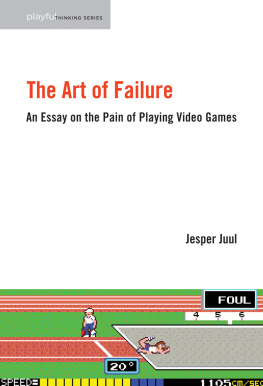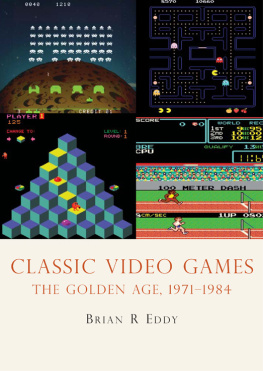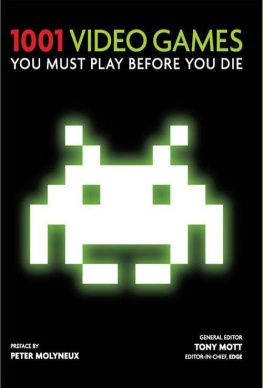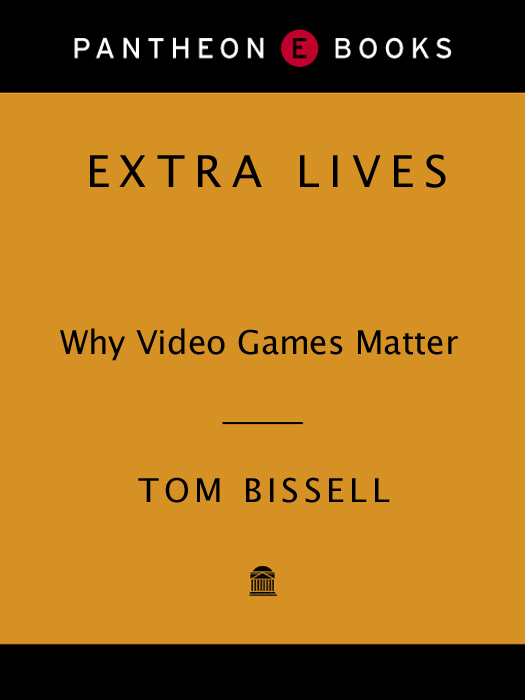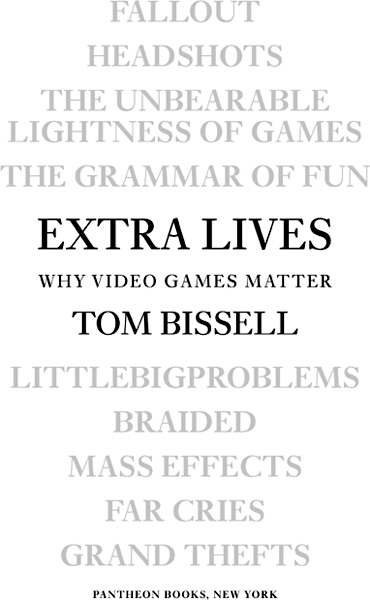AUTHORS NOTE
M artin Amis, the author of a fine book about early video games, once said of his predicament as a football fan, Pointy-headed football-lovers are a beleaguered crew, despised by pointy-heads and football-lovers alike. In this book I risk a similar sort of beleagueredness to explain why I believe video games matterand why they do not matter more. It grew out of the last three years of my life, during which I spent quite a bitpossibly even mostof my time playing video games, marveling at the unique ways they affected me and growing frustrated by the ways they did not. Soon enough, I was taking notes, not yet fully aware that what I had actually begun to do was write this book.
Needless to say, it is no easy thing to make a living as a critic of anything, but video-game criticism may be the least remunerative of all. Why this should be is not a great mystery. Count off the number of people of your acquaintance inclined to read criticism at all; chances are lean they will be the same people in your life as the ones playing video games. Yet certain aspects of video games make them resistant to a traditional critical approach. One is that many games are not easily re-experienceable, at least not in the way other mediums are re-experienceable. If I am reviewing a book, I go back and look at my margin notes. An album, I set aside an hour and listen to it again. A film, I buy another ticket. If I am playing a game that takes dozens of hours to complete and has a limited number of save slots, much of it is accessible only by playing it through again, the game itself structurally obligated to fight me every inch of the way. Another problem is that criticism needs a readily available way to connect to the aesthetic past of the form under appraisal, which is not always so easy with video games. Out-of-date hardware and out-of-print games can be immensely difficult to find. Say you want to check on something that happens about halfway through some older game. Not only do you have to find it, you will, once again, have to play it. Probably for hours. Possibly for days.
One might argue that critical writing about games is difficult because most games are not able to withstand thoughtful criticism. For their part, game magazines publish game review after game review, some of which are spritely and sharp, but they tend to focus on providing consumers with a sense of whether their money will be well spent. Game magazine reviewers rarely ask: What aesthetic tradition does this game fall into? How does it make me feel while Im playing it? What emotions does it engage with, and are they appropriate to the games theme and mechanics? The reason game magazine reviewers do not ask these questions is almost certainly because game magazine owners would like to stay in business. But there is a lot of thoughtful, critically engaging work being done on games. It is mostly found on the blogs and almost always done for free. I have my list of the five game critics whose thoughts on the form I am most compelled by, and I am fairly certain that none of these writers is able to make anything resembling a living writing only about games. Certainly, this is the case for the top critics of plenty of other art formsdance, sculpture, poetrybut none of these art forms is as omnipresent, widely consumed, or profitable as video games.
I say all this up front to signal my awareness that I am far from the first to arrive at this particular party. As a work of criticism, however, this book is somewhat eccentric and, at times, starkly personal. Moreover, its focus falls heavily upon console games (as opposed to personal computer games) released in the last few years, most of which are amply budgeted story or narrative games, which may displease some readers. From this, no one should assume I am not fond of older games or that I do not play sports games, rhythm games, strategy games, puzzlers, or the like. I am and I do, and moreover will take on any comers willing to challenge me to expert-level drumming in Rock Band or Guitar Hero (unless you happen to go by the gamertag Johny Red Pants, in which case, I bow to you, fair sir). The fact is, most of the games that made me want to write this book are console games of relatively recent issue, as opposed to the classics of the form. Few mediums are as prone to the evolutionary long jump as the video game, and I am aware that my focus on contemporary games puts these pages in danger of seeming, in only a few years, as relevant as a biology textbook devoted to Lamarckism. While the games I examine may be contemporary and somewhat of a piece, the questions they raise about the video-game form are not likely to lose their relevance anytime soon.
There are many fine books about the game industry, the theory of game design, and the history of games, overmuch discussion of which will not be found here. I did not write this book as an analyst of industry fortunes (a topic about which I could not imagine caring less) or as a chronicler of how games rose and came to be, and my understanding of the technical side of game design is nil. I wrote this book as a writer who plays a lot of games, and in these pages you will find one mans opinions and thoughts on what playing games feels like, why he plays them, and the questions they make him think about. In the portions of the book where I address game design and game designers, it is, I hope, to a formally explanatory rather than technically informative end.
Just what is a video game? Decades into the development of the form, this question remains forbiddingly open. (As does the terms spelling: video game or videogame? I reluctantly prefer the former. Most game designers and critics favor the latter.) It may be years before anyone arrives at a true understanding of what games are, what they have done to popular entertainment, and how they have shaped the wider expectations of their many and increasingly divergent audiences. In my conversations with game designers, I was sternly informed, again and again, of the newness of their form, the things they were still learning how to do, and of the necessity of discarding any notion of what defines video games. I have come to believe that anyone who can tell you what a game is, or must be, has seen advocacy outstrip patience. One game designer told me that, due to the impermanent and tech-dependent nature of his medium, he sometimes felt as though he were writing his legacy in water. I nevertheless believe that we are in a golden age of gaming and hope this book will allow future gamers a sense of connection to this glorious, frustrating time, whatever path games ultimately take and whatever cultural fate awaits them.



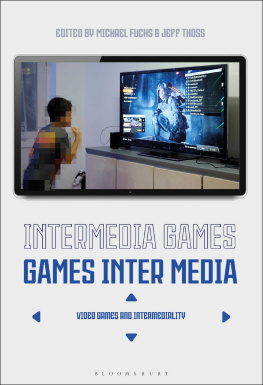
![Mark J. P. Wolf (editor) - Encyclopedia of Video Games: The Culture, Technology, and Art of Gaming [3 volumes]](/uploads/posts/book/279290/thumbs/mark-j-p-wolf-editor-encyclopedia-of-video.jpg)
